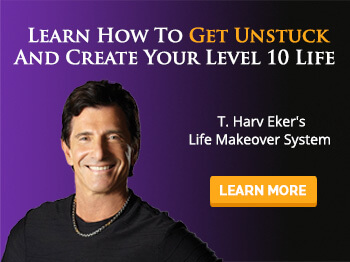Call it a symptom of our culture, society, our brain that gets too big for itself sometimes—call it whatever you want. The truth is people have a tendency to make things way harder on themselves than they have to. They overcomplicate things. Or it’s the complete opposite—we want things fast and easy.
No matter what we intend or what we’re going after in life, it’s going to take some energy, some effort—maybe even lots of it! That’s the Law of Maintenance. Everything that you have in your life takes some form of energy to keep, keep up, or keep at.
For example, know anybody that owns a boat? Ever dreamed of owning one yourself? Boating is awesome, but do most people stop to think about getting the boating license, then the docking fees, then having the right vehicle to tow that thing around, then figuring out where you’re going to keep that sucker when you’re not boating or off-season in places that get really cold …
Not trying to turn anybody off their boating dreams, but I just wanted to illustrate the notion that when you choose a track, you better be looking ahead at the big picture, or all the focus and intention in the world may take you way far from where you really want to be.
Wherever you’re spending your energy, for heaven’s sake keep it simple! This is what K.I.S.S. means. But not just simple—also smart! Keep It Simple and Smart.
How many of you have realized that sometimes your best moves are to not make any more moves? We can have these “brilliant” ideas, but they can take us away from what is actually working right now in life and our current focus. Trying to take on other things means you’ve got to figure out how to get them done, and then you’re off to the Scatter Brain Races.
If you want to be successful, sometimes you’re going to have to work a little harder. Yes or no? That’s just the way it is. But when something is working for you, that’s when you start pressing on the gas. If you are working in areas that you’re not good at, you better recreate what you’re doing in such a way that allows you to work with your strengths and only those strengths.
Off course, lots of people have difficulty finding that something that works. One of the biggest problems most people have—our whole society has—is that we tend to focus on our weaknesses. Every one of us was born with very specific talents and strengths to use. Are you using your talents? Are you using them day to day? What are you doing with your time?
So here’s an exercise to think about. What percentage of your time do you spend on your strengths, whether it’s in business or out in the world with family, friends, activities, etc.?
Turn on the news and there are plenty of reasons not to be so optimistic about a lot of things. There is no denying the new realities we’re forced to reckon with as the world turns, but we have to keep in mind that we are part of a larger tapestry of cycles, both natural and man-made. There are always ups and downs as sure as there are seasons.
We’ve had severe economic recessions before. We’ve had whole world economies change before. Social and political controversy is nothing new. Yet, as wildly as the pendulum swings, the world always seems to also move back through stages of equilibrium.
No matter how bad things may seem, there will be an upswing at some point. Just because we can’t see it doesn’t mean we shouldn’t prepare for it. This isn’t mere “positive thinking.” If you’re not preparing for your eventual success and happiness, then what the heck are you doing?!
The fact is that most people don’t reach their full potential—even if the economy were booming—because most people operate on a very superficial level of life based only on what they can see in the visible world.
We need to connect our inner reality with the inevitabilities of universal reality. Most people never understand and/or utilize the fact that the results of interacting with physical, material world are nothing more than a print-out of our mental, emotional, and spiritual worlds; individually and collectively. Our results are the fruit, but there are roots that create the fruit.
So we take a look at the fruit of our lives—our results—and maybe we don’t like them. They don’t taste so good. There aren’t enough. They’re too small. But these strange fruit didn’t just come out of nowhere.
Who are you? How do you think? What are your beliefs? What are your habits? What are your traits? How do you really feel about yourself? How confident are you in yourself? How confident are you in others? What’s your ability to take action in spite of fear and worry? What’s your ability to take action in spite of inconvenience, discomfort, or when you’re not in the freaking mood?
There’s a saying: ‘It’s not enough to be in the right place at the right time. You have to be the right person in the right place at the right time.’
How do you know when the time is right? You don’t! That’s why it’s so important to be who or what you strive to be now! We do this because that’s what it means to show up in excellence even when you think there’s really nothing on the line. There’s always something on the line—you! Your principles. Your values. Your mindset. Your habits. Your actions. Your results. We constantly have to till our own soil no matter what. Only then will we be in a position to reap the rewards of the inevitable change of seasons.
Now it’s time to share your thoughts with the community. How are you showing up in these difficult times? How are you keeping your mental, emotional and spiritual center? What are some strategies or tricks you’ve employed to keep fear and anxiety at bay? We want to hear from you!
A lot of people lower their expectations for fear of disappointment, yes? After all, if you don’t expect much, the worst that can happen is you won’t be too disillusioned when things don’t turn out the way you expect them to, and the best that can happen is you’ll be pleasantly surprised.
What if we were to apply that principle to business? There’s this so-called “conventional wisdom”: Under-promise and over-deliver. If your customer or client doesn’t expect much because you weren’t trying to sell them the moon, then they can only be satisfied with whatever you deliver that was expected, if not pleasantly surprised that you gave them more. That seems reasonable, right?
Wrong! When it comes to marketing your product or service, if you under-promise there won’t be anybody to deliver to! Who’d be interested? No one wants to hear, “What I have to offer is okay.” They want to hear, “This’ll knock your socks off!”
I’ve heard the typical response more times than I can count. ‘Well I don’t want to promise something I can’t deliver.’ Who said anything about over-promising? We’re talking about making a big promise. And when you do it, then yeah, it’d be a great idea to keep it, so make sure it’s something you can indeed deliver.
But people understate themselves because they don’t want to appear cocky, or conceded, or because they want to be “realistic.” A lot of the time, it’s just the usual suspect at play—fear. When you make a big promise, the pressure is on to come up with the goods at the highest level.
If you put a big promise out there, it’s going to put the pressure on you in a positive way to be your best.
Today’s reality is that consumers and the marketplace are changing at lightning speed. It doesn’t take much for a prospect’s attention to go elsewhere. If you don’t tell customers why they should buy from you, but your competitors do … then guess who gets the customers?
You start by examining why you’re starting your business to begin with (Focus!). What was missing in that market that you promised to fix? What’s your product or service’s single most important attribute? What makes it unique? What emotions do you want your customers to feel when they use your product?
We have to start with expecting more from ourselves. We can do more, be more, achieve more, even if we haven’t got all the answers now. We may have let someone or ourselves down at some point before. It’s okay. We know better now, yes?
If you get a chance, see this movie on DVD called “The Blind Side.” Watching it recently reminded me of some of the core values and principles we’ve been looking at lately.
It’s a true story about a kid from Memphis who had—to put it mildly—an extremely tough childhood through no fault of his own. But he had two things going for himself. First, he was huge, which made him attractive to high school sports coaches. But also, when most others saw him as unintelligent, a caring teacher identified his greatest aptitude: his instinctive ability to protect others.
He was eventually adopted by a wealthy family who helped him get stabilized and properly educated, but everyone was dying to see what he could do on a football field as on offensive lineman. What better place for a painfully shy kid to show of his greatest ability, right?
Problem was he had never played any organized sports. So he’s out there holding the defensive guys (which is a penalty), picking them up and carrying them down the field (another penalty), anything and everything accept the right way to protect his teammates—if the defense wasn’t simply running around him and smearing his offensive guys.
According to the movie at least, his adopted mom pulled him aside in practice one day and connected his natural protective instinct with the emotion of protecting his team as he would his adopted family, whom he came to love a great deal. Once that connection stuck, he became an unstoppable machine. Heavily recruited, he could’ve gone to virtually any college he wanted. Today he’s a pro football star.
His story illustrates something important that we have to get straight in business and in life: Get in the Game! Have you ever had a good idea about a business or a project or something, but you didn’t feel like you knew enough about it, or you didn’t feel like you were really proficient at it, or that you weren’t ready? What ended up happening? My guess is you said, ‘I’ll wait,’ and you never did it, yes or yes?
It’d be great to get things right the first time, but how often does that actually happen? Whatever it is we’re good at, we can always get better. In fact, we have to if we want to be successful in the long term.
The young man highlighted above, Michael Oher (pronounced oar), could’ve been a high-ranking officer or soldier, a policeman, a social worker, bodyguard to the stars—all sorts of paths could have yielded high success and happiness just by him using his natural protective instinct and physical abilities. And he had just about everything working against him from the day he was born.
But it wasn’t just the material resources of his adopted family that saved him. He could have easily walked into that socially and culturally shocking environment, been offered opportunities most kids in situations like his will never have, and said, “No thanks.” Or he could’ve given up, but he didn’t. He made a choice to get in the game and stay there.
Not every story of success has to be about multi-millionaires. People are overcoming adversity everyday, in ways big or small. Do you know any true stories of people overcoming misfortune and finding success? What’s your story? We want to hear from you!







